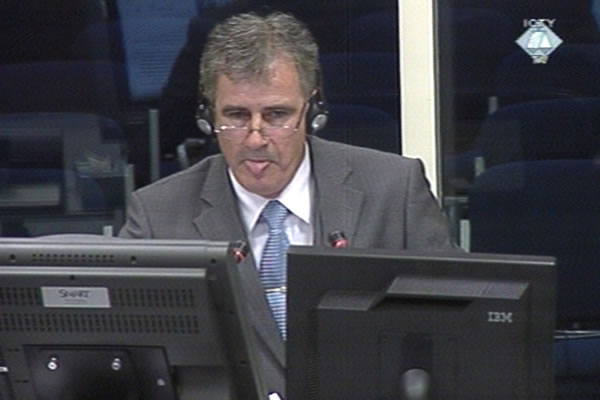Home
AMBASSADOR DENIES GENOCIDE AND MOCKS VICTIMS
Defense witness Gordan Milinic, former Karadzic’s security advisor turned ‘minister counselor’ and ‘career diplomat’ representing Bosnia and Herzegovina abroad, denies genocide and mocks the Srebrenica victims. Milinic blamed everything on General Mladic’s ‘military junta’
 Gordan Milinic, defence witness of Radovan Karadzic
Gordan Milinic, defence witness of Radovan Karadzic Former BH ambassador in Moscow, now an employee of the Foreign Ministry in Sarajevo, Gordan Milinic continued today his performance in court. Evincing none of diplomatic skills, and disparaging the victims, Milinic contested the genocide in Srebrenica. Before he embarked on a career in diplomacy, Milinic used to be a military security officer. During the final two years of the war and during the Srebrenica massacre, Milinic was President Karadzic’s security advisor. Karadzic called him as his defense witness.
Today Milinic repeated what he had said yesterday: that the accused as the supreme commander of the armed forces didn’t sign Directive 7 in March 1995. The directive ordered the troops to create conditions of ‘total insecurity with no hope of further survival or life for the inhabitants of Srebrenica and Zepa’. Milinic admitted the order was ‘wrong and inappropriate’, but questioned the authenticity of Karadzic’s signature on the document. Prosecutor Melissa Pack brought up Karadzic’s speech in the Assembly on 6 August 1995, when Karadzic said, verbatim, ‘I signed Directive 7 ordering the capture of Teocak, enclaves Srebrenica, Zepa and Gorazde, everything was signed and we really pushed it’. Commenting on the president’s speech, Milinic, himself a diplomat and a security officer, embarked on a linguistic analysis. ‘The word used by Karadzic, signirati, means to mark, or forward, and that is not the same as to sign’, Milinic explained.
However, in another address to the assembly, in October 1995, the accused said that he had signed ‘seven directives, but not the 8th and the 9th’. Karadzic explained that ‘as the supreme commander he endorsed the plan for Srebrenica and Zepa and personally oversaw it’. When he could no longer claim that the signature was not Karadzic’s, the witness quickly thought of another ploy: someone from the military may have ‘slipped’ the directive among the other documents. As a result, Karadzic ‘didn’t know what he was signing’. It was General Mladic’s ‘military junta’, the men who balked at nothing. They were definitely ready to cheat the naïve Karadzic. In the re-examination, the accused showed the witness the first six directives that had been initialed by Mladic. The implication was that the claim that he had signed the directives was just an attempt to brag before the assembly.
A bare handful of Karadzic’s witnesses who testified about Srebrenica denied the genocide fully; most of them tried to convince the judges that they and the accused had been completely unaware of it. Milinic clearly belongs to the first group, maintaining that there definitely was no crime. ‘A few people may have been executed’, Milinic contended; what he meant by ‘a few’ was a few hundred victims. Most of the men were killed as they were trying to break out from Srebrenica. As an experienced security officer and a ‘man who knew everything’, as he portrayed himself, Milinic presented a very original version of the breakthrough. About 15,000 Muslims left Srebrenica; on their way to Tuzla they stopped because they wanted to burn down Zvornik. Their plan failed when the State Security Service informed Mladic that 15,000 men had fled from Srebrenica secretly. Mladic first thought that they were joking. Then Mladic sent the troops, prevented the burning of Zvornik and dealt with the Srebrenica fugitives. According to Milinic, in the fierce clash, Muslims charged and the Serb soldiers ‘mowed them down with machine guns’. Thousands of Muslims were killed in the assault; the Serb side had about 40 dead.
In parts of his evidence, the witness openly mocked the Srebrenica victims, saying that the cemetery in Potocari was ‘a big farce and fraud’. According to Milinic, the cemetery contained the remains of those who died of natural causes, not the victims of the crimes. Milinic also said that after the war ‘1,000 Muslims from Srebrenica’ who were listed among the victims were registered to vote in the BH national election in Vienna for the diaspora list. ‘How can they vote if they are dead’, the witness asked, careless of the offense he caused to the victims yet again.
Although yesterday Milinic clearly stated what his job was, Judge Kwon apparently couldn’t understand how that was possible and asked him at the end of his evidence to state his current position again. Milinic replied he was a ‘minister counselor’ in the BH Foreign Ministry in Sarajevo, adding that he was awaiting a new diplomatic posting, where his moral, intellectual and diplomatic qualities will once again come to the fore somewhere abroad, in the service of all the citizens of Bosnia and Herzegovina.Linked Reports
- Case : Karadzic
- 2013-06-11 KARADZIC’S WITNESSES BLAME MLADIC’S ‘MILITARY CLIQUE’
- 2013-06-10 FRENCH AND SERB NATIONALISTS DEFEND KARADZIC
- 2013-06-07 SESELJ’S THREATS STILL VALID
- 2013-06-13 WHEN DID ‘WHISPERS’ ABOUT CRIMES IN ZVORNIK REACH KARADZIC?
- 2013-06-19 KARADZIC’S WITNESS: ‘MORE THAN 50 PERCENT OF SREBRENICA IS FRAUD’
- 2013-06-20 HOW KARADZIC WAS TRICKED
